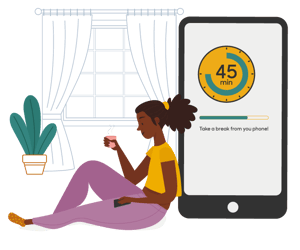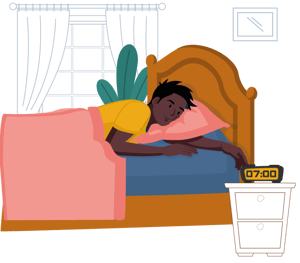Technology has made our lives easier, better and so much more efficient. By streamlining our schedules, simplifying work and helping us keep in touch with family and friends, technology has added considerable hours (not all productive) to our day. But did you know most people spend an average of 3.15 to 4.5 hours a day on their phones? And that most people check their phones 58 times (even during work) in a day?
Too much of anything is good for nothing
Let’s admit it, it is hard to detach ourselves from tech’s ubiquitous reach - what with the constant ‘dings’ from our phones, laptops, tablets and other connected devices. However, with study after study pointing at the compulsive nature of technology and its harmful effects, there is a growing awareness about the need for digital detox.
What is a digital detox?
A person doing a digital detox refrains from using any form of electronic device connected to the internet for a period of time - this could be 2 days, a few weeks, or the duration of a vacation.
Contrary to what we may believe, studies have shown that our phones contribute to higher levels of stress and anxiety in us. Those phantom ringtones and alerts that our brain conjures up in the absence of our phones (yup, it’s not just you...!), is a classic example of that.
By disconnecting, we become more aware of the world around us and mindful about how we spend those idle minutes. Without our safety blanket to fiddle with, we are forced to look around, observe, and just be present.
Understandably, the first couple of days of cutting back on your mobile screen time are considered the toughest. Research and brain science have almost unanimously debunked the "21 days to make or break a habit" myth, citing that for most people it takes three times that or more.
Do I need a digital detox?
If the answer is a resounding NO, then you should probably consider it very seriously. Here is a list of signs you may be addicted to your phone:
- You find yourself ignoring your spouse or children while scrolling through your Instagram feed.
- The furniture in your house has a curious way of hopping around and bumping into you as you walk around (with your face burrowed in your phone).
- You feel the need to carry your phone even for your bathroom breaks.
- And you panic when you can’t find your phone or fear leaving the house without it.
- You’d rather text than call or talk in person.
- Your Insta worthy food often gets cold by the time you get to eating it.
- You find yourself engaging lesser and lesser in social conversations, preferring the company of your phone instead.
- You end your day looking at your phone, and begin your day doing the same.
Technology addiction is also known to result in sleep disorders, constant headaches, blurry eyesight, stiff fingers and even depression and anxiety. Compelling enough to give it a try?
Tips on making digital detox work for you
In our always-connected lifestyle, a complete disconnection from all forms of digital media likely isn't practical. However, the best form of disconnection is one that works for you. Here are a few tips:
|

|

|
|
|
 |

|
|
Steal back your life from your phone
Even if you don’t need a digital detox, we can all benefit by periodically checking in on our relationship with technology. The first step towards making a healthy change is acknowledging the unhealthy habits.






